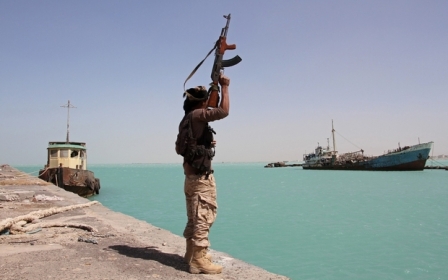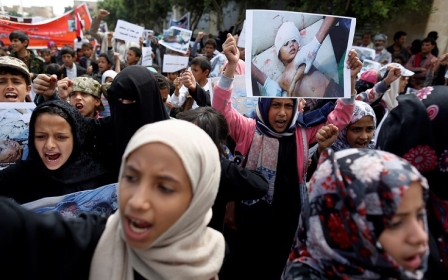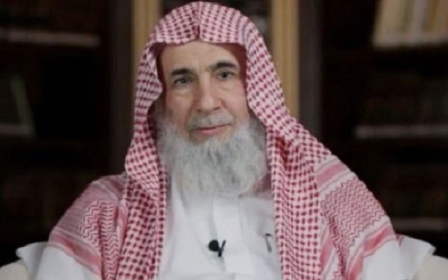Arabic press review: Israeli politician causes controversy in Morocco

Normalisation of Israeli-Moroccan relations?
Avi Gabbay, chairman of the Israeli Labor Party and its new candidate for prime minister in the upcoming elections, is currently visiting Morocco, a trip that has angered activists against Israel-Morocco normalisation, according to a report published by London-based newspaper al-Quds al-Arabi.
The Moroccan Observatory against Normalisation condemned the visit of the Israeli politician, describing it as "a terrible crime against all Moroccans", saying that such an incident inflames Moroccans who are against the Israeli occupation and aggression.
In a statement, the Observatory said there are "vigorous and effective attempts at a number of centres of influence in the Moroccan state to present the Zionist murderers and terrorists of Moroccan origin as Moroccan citizens who represent a Moroccan community in Israel", according to al-Quds al-Arabi.
The Observatory declared there is "a state of negligence vis-a-vis the protection of national sovereignty in the face of a dangerously escalating Zionist interference, which threatens the national security of Morocco in a very remarkable manner. The Zionists’ proper place is in court and prison for their endless crimes, instead of being warmly welcomed with care and hospitality," according to the report.
Al-Quds al-Arabi said details of Gabbay's visit, on which he is accompanied by his wife and children, have appeared in the Israeli media, which has said that the Labor leader uses his Moroccan origins to recruit many Israel supporters from north African countries.
Saudis’ crisis in Canada
Thousands of Saudi students studying in Canada have been plunged into crisis after their government ordered them to leave the country before the end of this month, the victims of a political spat between the two countries, according to news site Arabi21.
The electronic newspaper received a picture depicting a mosque in Canada full of Saudi families who are selling their furniture and belongings on the pavement outside, attempting to shift their possessions as they need to leave before 31 August on the orders of the Saudi government.
The picture, published by Arabi21, was taken days ago in front of the Mosque of the Nation in the city of Halifax in Nova Scotia province. The image shows furniture and personal belongings put up for sale in the courtyard of the mosque. The picture also shows cars put up for sale by Saudi students.
Many Saudi students in Canada have complained about the potential fallout from their government's decision to force them to leave following a diplomatic row sparked by a Canadian tweet about Riyadh's detention of a rights activist.
Many of them are about to finish their university studies, and some of them are only waiting for their MA or PhD results after spending years studying in Canada, according to Arabi21. Most of them have their families with them and have children studying in Canadian schools. Departing will cause them to lose their homes, furniture and cars.
Kuwait cancels contracts of 3,000 foreigners
The chairman of the Kuwaiti Civil Service Commission, Ahmad al-Jassar, has revealed that the contracts of more than 3,000 foreign employees (non-Kuwaiti citizens) working in different governmental departments will be cancelled, as part of a policy that aims to replace them with Kuwaiti citizens, according to the Algerian newspaper Elkhabar.
Jassar stressed the decision was taken in light of the state's policy of "nationalising" government job opportunities in ministries and governmental departments.
The Kuwaiti official stressed the need to continue implementing the "replacement policy" for the next four years until reaching a 100 percent growth rate in five employment groups, and reaching 95 to 98 percent for five other groups.
Lebanese family disappeared for 43 years
A Lebanese family has reappeared after vanishing at the beginning of the Lebanese Civil War in 1975. The family disappeared for more than 43 years and was found again thanks to Facebook, according to the Saudi newspaper al-Hayat.
Forty-three years after relatives believed that Samira, who married Izzat al-Hilu in 1975 and had five children and a single daughter, was slaughtered by armed militias along with dozens of other families, it turned out the family is still alive.
Former judge Jamal al-Hilu, Samira's brother-in-law, told al-Hayat that "in 1977, when the war had stopped for a year in Lebanon, Samira’s family went from west to east Beirut to check whether Samira or one of her children were still alive or had actually died in the massacre that took place in the infamously called 'Black Saturday'. The family met people in the area and asked about their daughter. However, they were told that everyone in the neighbourhood had been slaughtered."
In 2014, Samira's mother died. In 2016, Jamal al-Hilu, the husband of her sister Zainab, created a Facebook account which eventually led to the discovery and reunion with the lost family, al-Hayat newspaper reported.
New MEE newsletter: Jerusalem Dispatch
Sign up to get the latest insights and analysis on Israel-Palestine, alongside Turkey Unpacked and other MEE newsletters
Middle East Eye delivers independent and unrivalled coverage and analysis of the Middle East, North Africa and beyond. To learn more about republishing this content and the associated fees, please fill out this form. More about MEE can be found here.




